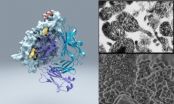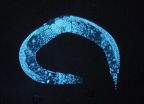(Press-News.org) LA JOLLA, CA—February 6, 2014—A team led by scientists at The Scripps Research Institute (TSRI) has discovered an unusual bacterial protein that attaches to virtually any antibody and prevents it from binding to its target. Protein M, as it is called, probably helps some bacteria evade the immune response and establish long-term infections.
If follow-up studies confirm Protein M's ability to defeat the antibody response, it is likely to become a target of new antibacterial therapies. The protein's unique ability to bind generally to antibodies also should make it a valuable tool for research and drug development.
"What Protein M does to antibodies represents a very clever trick of evolution," said Richard A. Lerner, MD, Lita Annenberg Hazen Professor of Immunochemistry and Institute Professor at TSRI who led the research.
The new findings, which were achieved through collaboration among several laboratories at TSRI and elsewhere, are described in the February 7, 2014 issue of the journal Science.
Unexpected Discovery
The unexpected discovery originated from an effort to understand the origin of multiple myeloma, a B-cell carcinoma. Clonal B-cell proliferation, as well as lymphomas and myelomas, can result from chronic infections by organisms such as Escherichia coli (E. coli), Helicobacter pylori (H. pylori) and hepatitis C virus.
To better understand this process, the team investigated mycoplasma, a parasite that infects people chronically and is largely confined to the surface of cells. In a search for factors associated with long-term mycoplasma infection, Rajesh Grover, PhD, a senior staff scientist in the Lerner laboratory, tested samples of antibodies from multiple myeloma patients' blood against a variety of mycoplasma species. One of the proteins recognized by the antibodies was from Mycoplasma genitalium, which causes sexually transmitted infections in humans.
To the scientists' surprise, every antibody sample tested showed reactivity to this protein. But further tests made clear that these antibody reactions were not in response to mass infection with M. genitalium. Instead, the scientists found, the mysterious M. genitalium protein appeared to have evolved simply to bind to any antibody it encounters.
That presents a potentially major problem for the immune system. The antibody response is meant to combat invading pathogens with precisely targeted attacks, each selected from an enormous repertoire of hundreds of millions of distinct antibodies. In effect, the system is designed not to bind universally to any one target. If it did, then such a target could act as a universal decoy, potentially nullifying the entire antibody response.
The current research suggested that M. genitalium has evolved such a decoy. "It binds to every antibody generically—capable of hijacking the entire diversity of antibody repertoire—but at the same time it blocks the specific interaction between that antibody and its intended biomolecular target," said Grover.
'Protein M'
The team decided to call it "Protein M."
To better how understand Protein M works, Xueyong Zhu, PhD, a staff scientist in the laboratory of Ian Wilson, DPhil, Hansen Professor of Structural Biology and chair of the Department of Integrative Structural and Computational Biology at TSRI, and colleagues took a structural biology approach. Using X-ray crystallography and other techniques, including electron microscopy in the TSRI lab of Assistant Professor Andrew Ward, PhD, the team determined the protein's 3D atomic structure while the protein was bound to various human antibodies.
Compared to thousands of known structures in the Protein Data Bank, the worldwide structure database, Protein M appeared to be unique.
The data also revealed that Protein M binds to a small, unchanging—"conserved"—region at the outer tip of every antibody's antigen-binding arm. "It likely extends the other end of itself, like a tail, over the antibody's main antigen-binding region," Zhu said.
The team is now studying Protein M's function during M. genitalium infections. It seems likely that the oddball protein evolved to help M. genitalium cope with the immune response despite having one of the smallest bacterial genomes in nature. "It appears to represent an elegant evolutionary solution to the special problem that mycoplasma have in evading the adaptive immune system," said Grover. "The smallest parasitic bacteria on planet earth seems to have evolved the most sophisticated invading molecular machine."
Unusual—and Unusually Useful
If Protein M is confirmed as a universal decoy for antibodies, it will become a target for new drugs, which could make it easier to treat chronic, sometimes silent infections by M. genitalium and by any other microbes that have evolved a similar antibody-thwarting defense. Chronic infections can lead to a host of other problems, including inflammatory diseases and cancers.
In principle, Protein M also could be engineered to target specific groups of B cells—immune cells that produce antibodies and express them on their surfaces. Thus, Protein M could deliver cell-killing toxins to cancerous B cells but not healthy ones, for example to treat certain lymphomas.
In the era of antibody-based drugs, the most immediate use of Protein M is likely to be as a tool for grabbing antibodies in test tubes and cell cultures, useful for the preparation of highly pure antibody for research and drug manufacturing. Other generic antibody-binding proteins have been put to use in this way, but so far it appears that none does the job quite as well as Protein M. "It may be the most useful antibody purification device ever found," said Lerner, who is already in talks with industry to commercialize the protein.
INFORMATION:
In addition to Lerner, Wilson, Grover and Zhu, authors of the study, "A Structurally Unique Human Mycoplasma Protein that Generically Blocks Antigen-Antibody Union," were TSRI's Travis Nieusma, Teresa Jones, Isabel Boreo, Amanda S. MacLeod, Adam Mark, Sherry Niessen, Helen J. Kim, Leopold Kong, Vaughn V. Smider, Daniel R. Salomon and Andrew B. Ward; Nacyra Assad-Garcia, Keehwan Kwon and John I. Glass of the J Craig Venter Research Institute in Rockville, MD; Marta Chesi of the Mayo Clinic Arizona; Diane F. Jelinek and Robert A. Kyle of the Mayo Clinic College of Medicine in Rochester, MN; and Richard B. Pyles of the University of Texas Medical Branch, Galveston, TX.
The study was funded in part by the National Institutes of Health (RO1 AI042266, R21 AI098057, R01 AG020686, K08 AR063729, RR017573, U19 AI06360).
The ultimate decoy: Scientists find protein that helps bacteria misdirect immune system
2014-02-06
ELSE PRESS RELEASES FROM THIS DATE:
Decoding dengue and West Nile: Researchers take steps toward control of health proble
2014-02-06
ANN ARBOR—Dengue fever and West Nile fever are mosquito-borne diseases that affect hundreds of millions of people worldwide each year, but there is no vaccine against either of the related viruses.
A team of scientists at the University of Michigan and Purdue University has discovered a key aspect both to how the viruses replicate in the cells of their host and how they manipulate the immune system as they spread.
In a study scheduled for online publication Feb. 6 in the journal Science, researchers led by Janet Smith of the U-M Life Sciences Institute describe for ...
Autism: Birth hormone may control the expression of the syndrome in animals
2014-02-06
This news release is available in French.
The scientific community agrees that autism has its origins in early life—foetal and/or postnatal. The team led by Yehezkel Ben-Ari, Inserm Emeritus Research Director at the Mediterranean Institute of Neurobiology (INMED), has made a breakthrough in the understanding of the disorder. In an article published in Science, the researchers demonstrate that chloride levels are elevated in the neurons of mice used in an animal model of autism, and remain at abnormal levels from birth. These results corroborate the success obtained ...
Opening 'the X-files' helped researchers to understand why women and men differ in height
2014-02-06
Researchers from the University of Helsinki analyzed thoroughly the commonly occurring genetic variation in chromosome X, one of the two sex-determining chromosomes, in almost 25,000 Northern European individuals with diverse health-related information available. The aim of the study was to find genetic factors that could explain individual differences in several traits, including BMI, height, blood pressure and lipid levels. In addition, the researchers also investigated whether the X chromosome would contribute to some of the well-known differences between men and women ...
Theorists predict new forms of exotic insulating materials
2014-02-06
CAMBRIDGE, Mass-- Topological insulators — materials whose surfaces can freely conduct electrons even though their interiors are electrical insulators — have been of great interest to physicists in recent years because of unusual properties that may provide insights into quantum physics. But most analysis of such materials has had to rely on highly simplified models.
Now, a team of researchers at MIT has performed a more detailed analysis that hints at the existence of six new kinds of topological insulators. The work also predicts the materials' physical properties in ...
Researchers pinpoint protein associated with canine hereditary ataxia
2014-02-06
Researchers from North Carolina State University have found a link between a mutation in a gene called RAB 24 and an inherited neurodegenerative disease in Old English sheepdogs and Gordon setters. The findings may help further understanding of neurodegenerative diseases and identify new treatments for both canine and human sufferers.
Hereditary ataxias are an important group of inherited neurodegenerative diseases in people. This group of diseases is the third most common neurodegenerative movement disorder after Parkinson's and Huntington's diseases.
In people with ...
Nutritional supplement improves cognitive performance in older adults, study finds
2014-02-06
Tampa, FL (Feb. 6, 2014) – Declines in the underlying brain skills needed to think, remember and learn are normal in aging. In fact, this cognitive decline is a fact of life for most older Americans.
Therapies to improve the cognitive health of older adults are critically important for lessening declines in mental performance as people age. While physical activity and cognitive training are among the efforts aimed at preventing or delaying cognitive decline, dietary modifications and supplements have recently generated considerable interest.
Now a University of South ...
Immune system 'overdrive' in pregnant women puts male child at risk for brain disorders
2014-02-06
Johns Hopkins researchers report that fetal mice — especially males — show signs of brain damage that lasts into their adulthood when they are exposed in the womb to a maternal immune system kicked into high gear by a serious infection or other malady. The findings suggest that some neurologic diseases in humans could be similarly rooted in prenatal exposure to inflammatory immune responses.
In a report on the research published online last week in the journal Brain, Behavior and Immunity, the investigators say that the part of the brain responsible for memory and spatial ...
Source of chlamydia reinfections may be GI tract
2014-02-06
The current standard of care treatment for chlamydia sometimes fails to eradicate the disease, according to a review published ahead of print in Infection and Immunity, and the culprit may be in the gut.
Chlamydia trachomatis not only infects the reproductive tract, but abides persistently—though benignly—in the gastrointestinal tract. There it remains even after eradication from the genitals by the antibiotic, azithromycin, says first author Roger Rank, of the Arkansas Children's Research Institute, Little Rock. And that reservoir is likely a source of the all-too-common ...
Scientific review points to supplement users engaging in a pattern of healthy habits
2014-02-06
Washington, D.C., February 6, 2014—Dietary supplement users take these products as just one component of a larger effort to develop a healthier lifestyle, according to a newly published review in Nutrition Journal, a peer-reviewed scientific publication. The review, "Health Habits and Other Characteristics of Supplement Users" (Nutrition Journal.2014, 13:14), co-authored by Council for Responsible Nutrition (CRN) consultant Annette Dickinson, Ph.D., and CRN's senior vice president, scientific and regulatory affairs, Duffy MacKay, N.D., examined data from 20 peer-reviewed ...
Global regulator of mRNA editing found
2014-02-06
An international team of researchers, led by scientists from the University of California, San Diego School of Medicine and Indiana University, have identified a protein that broadly regulates how genetic information transcribed from DNA to messenger RNA (mRNA) is processed and ultimately translated into the myriad of proteins necessary for life.
The findings, published today in the journal Cell Reports, help explain how a relatively limited number of genes can provide versatile instructions for making thousands of different messenger RNAs and proteins used by cells in ...



